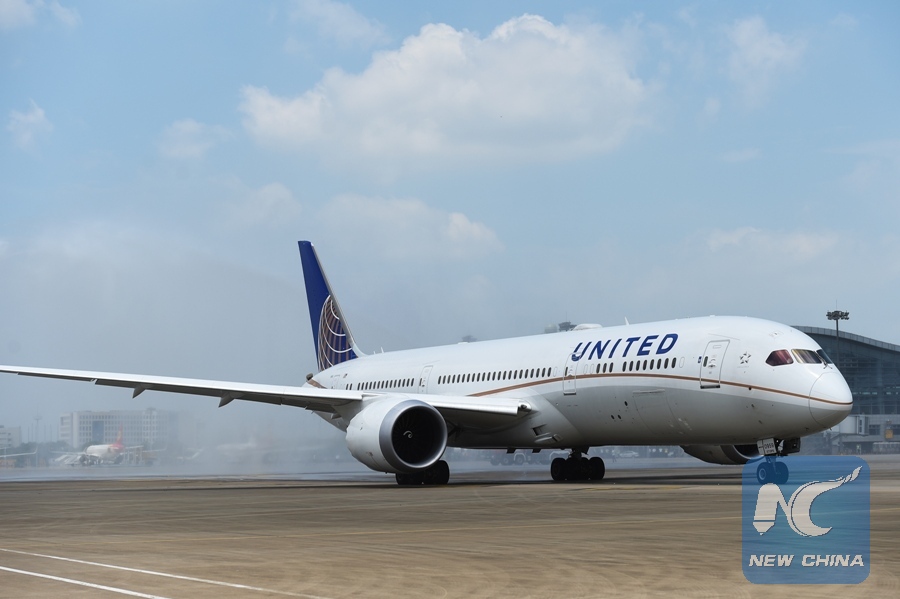
A United AirlinesBoeing 787-9 plane prepares to take off at Xiaoshan Airport in Hangzhou, capital of east China's Zhejiang Province, July 15, 2016. United Airlines on Wednesday inaugurated a three-times-weekly nonstop service from the U.S. West Coast city San Francisco to the southeast Chinese city of Hangzhou. (Xinhua/Huang Zongzhi)
WASHINGTON, May 4 (Xinhua) -- U.S. experts said Thursday China's new passenger planes pose no immediate threat to Western aviation companies such as Boeing and Airbus.
The maiden flight of China's C919 passenger plane, scheduled for Friday from Shanghai Pudong International Airport, represents one step towards the country's bid to reduce reliance on foreign airliners.
"The Chinese government is interested in establishing independence and self-sufficiency in all aspects of aviation," Douglas Royce, an aerospace expert at Forecast International, an aerospace market research firm, told Xinhua.
It is engaged in a long-term process of catching up to Europe, the United States, and Russia in commercial aircraft, he said, adding this is one step in that direction.
The 158-seat C919 is China's first large passenger jet and is expected to compete with the updated Airbus 320 and Boeing's new generation 737.
So far, 23 foreign and domestic customers, including China's national carrier Air China and leasing company GE Capital Aviation Service, have placed orders for 570 aircrafts, according to the Commercial Aircraft Corporation of China (COMAC), the manufacturer of the C919.
Royce predicted that demand for the C919 will be centered in the Chinese market and a few satellite markets in the early years of service.
"Airbus and Boeing have spent decades competing fiercely against each other and are lean and mean in the airliner market. The duopoly in the airliner sector has resulted in very well-made products," he explained.
"What COMAC faces here is not two bloated, non-competitive players. Both companies are at the top of their game," Royce said. "So it will be very difficult for COMAC to break into western markets, particularly when very few airlines have experience with using COMAC's aircraft in service."
In contrast, the A320 and 737 have huge advantages because the airlines already have built up a lot of knowledge and infrastructure around flying both types.
Richard Aboulafia, vice president at Teal Group Corp., a U.S.-based aeronautics analysis firm, held a similar view.
While building and flying a plane is an important step and an expensive one, the next steps such as customer support, finance, and the ability to offer aggressive discounts are "just as important, and just as expensive," he told Xinhua.
Even if the C919 ends up being a superior aircraft, it will still take years for many Western airlines to consider adding the type to their fleets, Royce noted.
But he added that the C919 might be able to get orders from startup airlines that aren't already flying either of the Western models. In addition, traditional customers of Russian passenger aircraft will also make viable sales targets.
To pave the way for the jet to enter foreign market, China has already been in talks with the European Aviation Safety Agency (EASA) and the U.S. Federal Aviation Administration (FAA) to obtain the airworthiness certification for the C919.
"Getting FAA and EASA certification would be a huge win for the program," Royce said. "The aircraft requires Western certification to compete directly with Airbus and Boeing in major markets. On a symbolic level, it also shows huge progress for China's civil aircraft industry."
However, he cautioned that certification is "a long and expensive process" for aircraft manufacturers in the U.S. and that for a newcomer like COMAC, dealing with the FAA is "a new world for them."
Aboulafia said while certification is necessary, it "has no impact on commercial competitiveness."
Meanwhile, COMAC estimated that it can sell 2,000 C919s over the next 20 years, but Royce said it's "way too optimistic."
"An estimate of 600-800 C919s over 20 years once production starts is a more reasonable goal given the very strong competition offered by Boeing and Airbus, coupled with Chinese-made airliners' lack of a long-term operating and maintenance history," he said.
"A COMAC-built airliner has no track record in either area, and it will take a long time for the aircraft manufacturer to establish itself as the equal of Airbus and Boeing in the area of global sales and product support."
However, over the very long term, Royce said, COMAC is likely to become "a major player in the airline segment."
"It's not something that will happen over the next decade, but rather a long-term process that will require ongoing support from the Chinese government," he said.
When asked to comment on the C919, a spokesman for Boeing told Xinhua: "We would like to take this opportunity to congratulate COMAC for the successful development of the C919 airplane."

